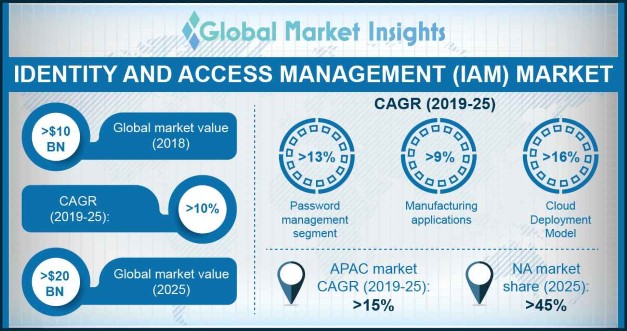Provisioning solution-based IAM market to accrue significant returns over 2018-2024, retail applications to drive the industry demand
Publisher : Fractovia | Published Date : 2018-09-25Request Sample
Increasing adoption of IoT technologies across businesses has apportioned massive earnings for the identity and access management (IAM) market, with enterprise operations becoming more digitized and data-driven. The deeper the digitization of an organization’s functioning, the more susceptible it is to data breaches, security leaks, inside attacks and privacy threats. Consequently, the need for regulated data access and digital identification to comply with security mandates and eliminate various risks has created an ideal demand for the identity and access management industry.
Japan Identity and Access Management (IAM) Market Size, By Solution, 2017 & 2024 (USD Million)

IAM has proven to be extremely crucial in coping with the evolving trends observed in the global workforce, including affinity to web-based applications and better adjustment to technology. The IAM provisioning segment has been vital in providing relevant access to millions of employees, partners and contractors associated with different companies, pushing the global identity and access management market valuation beyond USD 9.5 billion in 2017.
With the advent of advanced connectivity and the accompanying security risks that come with it, organizations are increasingly implementing formal IAM policies and procedures to address the need for account provisioning, review and revocations. New accounts need to be provisioned correctly and must be ready on time to make sure the user can be granted the access then needed. There are auditors, contractors and third-parties that require different access to an organization’s system and network, presenting the necessity of IAM for risk assessment and assigning suitable access rights. The identity and access management industry assists in coordinating the process of new user account creation, giving added access to temporary employees, authorized emails and access to other physical resources.
Companies in the retail sector are particularly subject to tremendous amount of personnel changes over a year and warrant significant revenue contribution towards the identity and access management market. Provisioning in the retail segment plays an important role in allotting identities to the staff as well as third-party logistic partners throughout stores where they do not have IT staff present on site and there is frequent turnover. With constant staff turnover, regional legislations and a vast number of seasonal workers, the fast moving retail sector is vulnerable to risks. However, provisioning solutions help protect customer confidence, revenue and the brand reputation. Also, retail is a data driven industry, and the services offered by identity and access management market allow for easier tracking of provided access and how they are handled.
In the U.S., almost 16 million people were working in retail as of November 2017, representing every one in ten workers in the country, including establishments like big private sector players, small businesses, gas stations and bowling alleys. The retail sector has further transformed to a great extent with the advent of ecommerce, bringing into focus latest businesses management techniques. The identity and access management industry enables the provision of IDs and access to data such as customer orders, warehouse locations and customer’s delivery address to delivery persons. Adopting the smartphone technology to track and report everyday operations has also allowed businesses to let their employees access remotely, greatly altering the IAM requirements and making the identity and access management industry more relevant.
An example justifying the critical nature of the identity and access management market was reported in 2017 when a retailer was able to save more USD 100,000 annually via a suitable IAM program. A retail company had a generous discount scheme for associates where they could buy anything in the company’s outlets for up to 40% discounts, not with the identity badges and not restricted to any region. However, the stores were managing the employee badges through a shared system which was not connected to a proper provisioning platform. These badges were deactivated a day after employee termination, but no process was in place to make them hand over their badges, allowing for fraud. Terminated employees would buy products at 40% discount and then sell them at a 20% profit on eBay, prompting the company to turn to the identity and access management industry.
After an appropriate IAM program was implemented, the company reported that results were significant, and the fraud cases were eliminated, saving a fortune for the company. As evident, retail sector is quite complicated and vulnerable to security risks, with retailers needing to deal with the dynamic nature of employment and the changing supplier network.
With most industry verticals deploying IoT technologies today throughout their businesses and facing potential risks in data security and handling personnel, the global identity and access management market is estimated to rope in nearly USD 18.9 billion in remunerations by 2024.